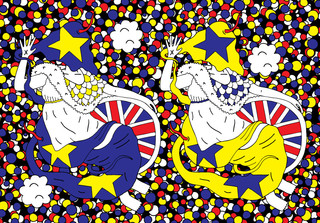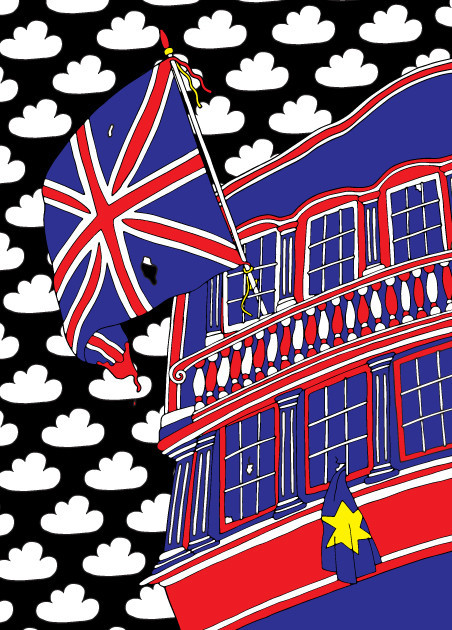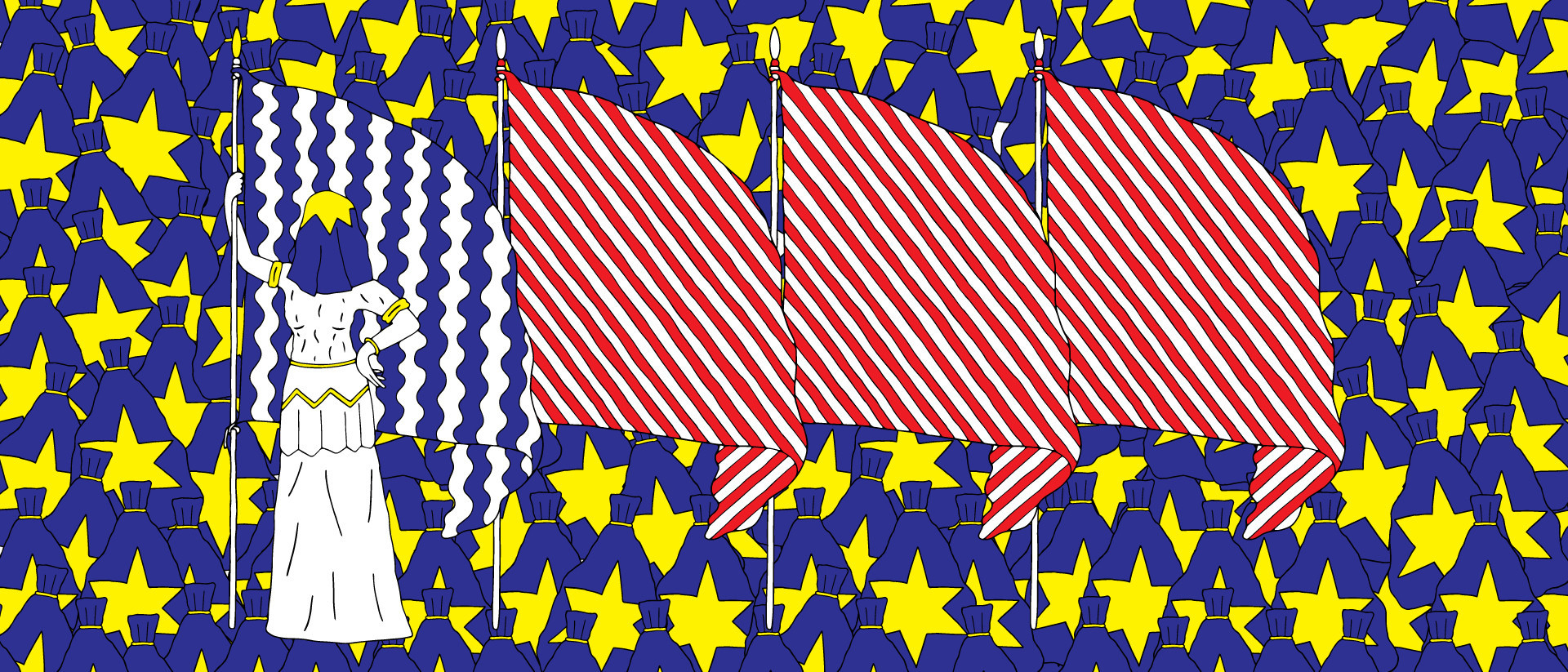1. What is the referendum all about (and how did we get here in the first place)?
Where would you like to start? Around 8,000 years ago, the land mass of Britain separated from the continent. It has been an island ever since – which shapes a nation’s psyche somewhat. So it all starts with geography.
And then there’s history. Britain was last occupied in 1066. Unlike much of western Europe, it has not spent several centuries as a battlefield for warring armies – so when the EU was mooted in the 50s, its founding purpose was perceived differently in Britain than on the European continent.
The history of Britain is global, and imperial. That, plus very different legal and intellectual traditions, and of course those oft-recalled World War II heroics, have combined to give it a profound sense of being – somehow – most exceptional.
What else drives British disaffection with Europe? Recently, the relative economic success of the UK in comparison with the eurozone – especially in terms of economic growth and low unemployment – has become a factor. Then there are the UK politicians who won’t ever praise Europe, because doing so costs them votes, and a press that is 75% eurosceptic and adores dripping corrosive untruths about Brussels.
All of this has combined to create the impression among many British citizens and some Conservative politicians, that the EU, far from being a collaborative project in which Britain has an influential voice, is in fact a wicked anti-British plot. The EU is seen as something that is done to us, that we suffer.
That’s the big picture.
The more immediate factors that led to this particular referendum being held now include the rise of UKIP – fuelled by genuinely felt (if not necessarily fully justified) fears over “uncontrolled” immigration, only part of it from the EU – and the desire of David Cameron to win the 2015 general elections.
Essentially, what happened was that the prime minister was so worried that his Conservative voters, and even some Conservative MPs, would defect to the anti-European party that during the election campaign, he promised them an in-out referendum to make sure he retained their support.
So here we now are. Driven largely by partisan politics, we are making an existential decision that could affect the country’s future for decades.
2. What happens next if the Brexit becomes a reality?
The problem with any question about the consequences of a Brexit is that the only honest answer is: nobody really knows.
Apart from Greenland – which left the EU in 1985, but has a population about half the size of The Hague’s so is not exactly a handy precedent, and Algeria, which automatically exited once it was no longer a part of France – no one has been here before. Brexit, in that sense, really is a leap in the dark.
In terms of the actual procedure, there would be little immediate change on June 24.
Under Article 50 of the Treaty on the European Union, London gets two years to negotiate its exit terms: what in the UK’s agreements with the EU would end, what would change, and what would stay the same.
Until those negotiations are over, we can only guess at the actual consequences of a Brexit for citizens and businesses, because they would depend on the terms of the Brexit deal. How much of the 80,000 pages of EU agreements translated into UK law will need be undone, and what will replace them?
Until those negotiations are over, we can only guess at the actual consequences of a Brexit for citizens and businesses.
Will Britain still have privileged access to the single market, and at what price? If not, on what terms will it be trading? Will British citizens still be able to study, live, work, be entitled to free healthcare in the EU without visas and permits? Will EU citizens be able to do the same in Britain? Will low-cost air travel, limited roaming costs, easy weekend trips to Amsterdam, Paris, and Barcelona survive?
To these and countless other practical questions, we have no real answer.
There is good reason, though, to suspect the other 27 EU member states will not want to make Brexit either an easy or a rewarding process. If Britain gets a good deal (if it manages to ditch the constraints of EU membership, while retaining the benefits), others might start thinking along similar lines….

Illustration by Jip Piet for The Correspondent
3. What would Brexit mean for the UK economy?
It is all but impossible to make accurate predictions about this – we are talking projections based on assumptions based on unknowns – but an overwhelming majority of respected economists, nationally and internationally, seem to agree that Britain’s economy would take, at the very least, a significant short- to medium-term hit.
If we can believe the Organization for Economic Cooperation and Development (OECD), the International Monetary Fund (IMF), the World Trade Organization (WTO), Britain’s own finance ministry, the Bank of England, and 600 leading British economists – all of whom, it is worth noting, have been accused by the Vote Leave campaign of fabrication and scaremongering – a Brexit would negatively affect GDP by between 1% and 6%.
Unemployment would surge, borrowing costs would rise, foreign investment in Britain would plummet. As Christine Lagarde, the managing director of the IMF, said: “We have looked at all the scenarios. We have done our homework. And we haven’t found anything positive to say about a Brexit vote.”
The Vote Leave-campagne points out that none of the above organizations has managed to get a financial or economic forecast even remotely right looking just a year ahead – let alone 15 years. So go figure.
4. What ramifications could the outcome have for other EU member states, or for the EU as a whole?
Officially at least, no EU government wants Britain to leave. They have good individual reasons for this, mainly to do with the balance of power within the EU and the liberal, free-market cause that Britain preaches.
But there’s another reason they want the UK to stay. They know the continent’s resurgent eurosceptics would be the first to welcome a Brexit: Marine Le Pen in France, Geert Wilders in the Netherlands, the populists of the Danish People’s Party, and Sweden Democrats would all hail the UK’s departure as a sign that there can be life outside the union – and that Europe is fragmenting.
Given the mood of populist anti-Europeanism now galloping across the union, there is little doubt a Brexit would deal a heavy political blow – at least in the short term – to the European project. Calls for public referendums in Denmark, Sweden, perhaps France and the Netherlands, would only multiply.
Given the mood of populist anti-Europeanism now galloping across the union, there is little doubt a Brexit would deal a heavy political blow – at least in the short term – to the European project.
Some suggest a Brexit might eventually be good for Europe, an opportunity, even. Without the anti-federalist objections of the UK, it is argued, a core group of eurozone integrationists – led by France and Germany, who in principle are certainly keen on the idea – could push unhindered down the road to political and economic union.
In theory, and in the longer term, that may well be so. We may, one day, end up with a hard federal core and a galaxy of looser, almost associate EU members. But the immediate political reality, with Angela Merkel and Francois Hollande weakened, makes this unlikely in the near term.
The EU faces major problems that it seems incapable of resolving: economic woes, stubborn unemployment, a migration crisis, a eurozone crisis, a Greek crisis, soaring nationalism, a manifest inability to convince its citizens it is in any way a good thing.
And then there are the economic consequences. Britain represents about 15% of the EU’s GDP. Kissing even part if that goodbye will not be without consequences: the OECD estimates the EU economy as a whole could shrink by 1%.
The trade insurance company Euler Hermes has calculated that the three countries hardest hit by a Brexit – after Britain itself – would be Belgium, Ireland, and the Netherlands, owing to the substantial scale of their investments and cross-trade with the UK. Corporate bankruptcies could rise by between 1.5 and 2.5 percentage points, it says.
5. Is it not better for both partners to end this unhappy marriage?
Perhaps. While this is certainly not a passionate union – and never was – it has been a marriage of convenience that has benefitted both parties; an irritating, occasionally infuriating partnership that has nonetheless made both sides quantifiably stronger.
Some might also say that what the pro-Brexit camp is actually proposing – which is, concretely, not a lot: there is no post-Brexit plan – amounts to walking out on your spouse for a new one you have never met.
Or, perhaps, giving up on your friends without any kind of social life to replace them.
We have all been out somewhere, have we not, with a bunch of mates, when one or two say: "This is rubbish. Let’s go somewhere else." So you all march out of the club – and only then do you realize that the people who wanted to leave have no idea where they might want to go instead.
The place you have just left, of course, will not let you back in. And so you find yourself standing at the pizza-by-the-slice stand at two o’clock in the morning, arguing furiously about whose fault it is that you’re now standing at the pizza-by-the-slice stand at two o’clock in the morning.
That’s where Britain could be.
On the other hand, of course, we might just sail off into the sunset on our latter-day Elizabethan galleon, cut ultra-advantageous trade deals with China and India and America, and blow Europe out of the water.
Who knows?

Illustration by Jip Piet for The Correspondent
6. What underlying emotions are underpinning the debate?
Anxiety, resentment, and not much love.
Among Leave voters, anxiety is a significant factor that the Remain camp ignores at its peril. People – particularly older people, people in the north and east of Britain, and less educated people – are genuinely worried and upset about immigration.
Recent studies show that immigration has been overwhelmingly positive for the British economy and responsible for a good chunk of growth, that EU migrants contribute far more in taxes (an estimated £20 billion – some $28 billion or €25 billion) than they take out in benefits, and that they have not depressed low-income wages.
But that message is clearly not reaching a very large number of people, who plainly continue to perceive immigration as strain on public services like schools and the NHS, a threat to jobs, and a negative influence on pay.
That’s a hard one for the remain camp, and particularly the government, to counter – because it is, after all, the government who should have been building the houses and hiring the doctors and teachers that all those EU migrants who were busy doing such wonders for the UK economy might need – this was a management issue, not an immigration issue.
There is no love for Europe evident in this abusive, negative, almost poisonous debate.
Public sentiment, though, has also been conditioned by Britain’s immigration experience in 2004, when it was one of just three EU countries to open its borders to workers from the accession countries of eastern Europe.
At the time, the government estimated 13,000 people would arrive from Poland, Latvia, the Czech Republic, and other eastern European countries. Two years later, the actual figure was 600,000 (the most recent number, for migrants from all EU countries combined, is just over 2 million).
There is resentment, too, at what is seen as Brussels’ meddling in Britain’s national affairs. The argument of sovereignty – who actually decides British laws – is, alongside immigration, by some measure the most powerful driver of support for the leave camp, across all social classes. The overwhelmingly eurosceptic British press (see below) is a big factor in this.
And love. There is no love for Europe evident in this abusive, negative, almost poisonous debate. Partly, that is a result of all the reasons I outlined in Question 1. This is a historic-cultural thing, you know?
Politically, it is because no British Conservative, given the depth of euroscepticism in some parts of the party, can admit to loving even an ideal of Europe, and hope to be re-elected. And the present Labour party leadership is at best lukewarm about an EU that has historically been viewed, by some on the left, as a neo-liberal project.
7. Which myths are perpetuated again and again by both camps?
There are myths, misrepresentations, and downright lies being propagated by both sides.
The remain camp has said a Brexit could cost 3 million jobs – except that’s based on an old estimate of the number of UK jobs that depend on EU exports, and no one imagines all UK exports to the EU would simply cease.

Illustration by Jip Piet for The Correspondent
The leave camp says a Brexit could and would allow the UK to cut EU immigration – except the UK finds it impossible to cut non-EU immigration, even with the kind of points-based, Australian-type system that Vote Leave has proposed for EU immigrants.
Remain has announced that if Britain leaves, every UK household would be £4,300 worse off by 2030 – and that house prices would fall by 18%. But this is nonsense: you can’t cite such precise numbers as these out of the air when they’re based on scenarios calculated from countless different variables and unknowns.
Vote Leave repeatedly claims “Britain sends Brussels £350 million a week”. It’s even plastered on the side of their campaign bus. But that doesn’t include the famous British rebate, or what comes back to the UK in EU spending – so EU membership actually cost the UK less than 40% of that figure last year.
The pro-Brexit side also say most British laws are "made in Brussels". But in more than 2,500 votes on proposed new EU laws taken in the EU council since 1999, British ministers have been on the "losing side" just 72 times.
A parliamentary committee has criticized both campaigns for making statements and quoting figures that are likely to mislead voters. No wonder people don’t know who to believe.
8. What role does the media play in polarizing the debate?
It’s hard to exaggerate the importance of the British press in the way the UK’s European debate has been framed – even in the internet age. The vast majority (around 75%) of British newspaper readers read a newspaper that is, and has been for many years, actively eurosceptic.
It has been a national sport for many British newspapers since the 1980s to bash Brussels
The Sun, Daily Mail, Times, Telegraph, and Express are all, to varying degrees, anti-European. The Guardian, Daily Mirror, and Financial Times are, to varying degrees, pro-European. The Independent is too, but it ceased printing a daily paper earlier this year.
Even when newspaper sales are declining, it is newspaper editorial decisions that continue to set the agenda for much TV and radio coverage. And it has been a national sport for many British newspapers since the 1980s to bash Brussels (even inventing myths about proposed EU bans on over-bendy bananas, double-decker buses, feet and inches, even fish-and-chips – unless the fish is identified by its Latin name).
The British press have fabricated so much rubbish about the EU over the years that the European Commission’s office in London was obliged to launch a website to debunk some of the myths. It currently has more than 650 entries.
9. What role does the Church of England play in the debate?
Historically, an interesting one that has certainly helped shape British attitudes with regards to Europe. The Church of England as established by Henry VIII was neither Catholic nor Calvinist, but nationalist and individualistic – a revolt against the continental establishment.
Today, the church has a lesser role. While many prominent church leaders (including a former Archbishop of Canterbury) have come out publicly in favor of Remain, the church itself has remained neutral.
It has, though, issued a much-needed referendum prayer: "God of truth, give us grace to debate the issues in this referendum with honesty and openness. Give generosity to those who seek to form opinion and discernment to those who vote, that our nation may prosper and that with all the peoples of Europe we may work for peace and the common good."
10. Would anything change if the Stronger in Europe movement triumphs?
It depends by how much.
A clear victory, by at least a 10-point margin, would reassure Britain’s European partners. It would also comfort David Cameron, who would then have to try to rebuild a Conservative party split savagely – and perhaps irreparably. (This so-called "blue-on-blue" fight is so brutal, with cabinet members and other leading Conservatives like Michael Gove and Boris Johnson openly questioning the government’s reason, that it is difficult to see how Cameron’s repair job might work.)
A narrow victory will be much more delicate. A two or three point margin of victory would open the doors to what could become civil war in the government, and to massive bitterness and anger among pro-Brexit voters.
Whatever the result, the Brexit question will never go away.

Illustration by Jip Piet for The Correspondent
11. Do you see similarities between Boris Johnson’s views on Brexit and the rise of Trump in the U.S.?
I see strong parallels between the pro-Brexit politician and the U.S. presidential candidate. One is that we are quite clearly in the age of what’s been called the ”post-fact politician".
"It’s all the fault of the immigrants/the Mexicans/the Muslims/the European Union. Vote for me!"
Politicians can say what they like, be called out for it, be proven either to have misrepresented reality, exaggerated the truth, or even to have lied outright – it doesn’t affect their popularity in the least. If anything, it seems they are considered honest and genuine .
Nationalists and populists are clearly on the rise in many countries. We live in uncertain times.
People are worried for their livelihoods and their future and some are attracted to politicians who stand up and say: "It’s okay. This isn’t really complicated. It’s actually quite easy. It’s all the fault of the immigrants/the Mexicans/the Muslims/the European Union. Vote for me and I will make America – or Britain – Great again."
12. Are you perfectly fine with the idea of a Brexit? Or do desert island nightmares keep you up at night?
Personally, I studied French and German at university. I lived and worked on the continent – in the Netherlands, Brussels, Scandinavia, and for a decade in Paris – for more than 20 years. My wife and children are French.
I consider myself a citizen of Europe and I believe, quite profoundly, in the value of the European project.
I do not believe the EU is right as it is, far from it – I have spent enough time reporting, for example, on the consequences of the financial crisis in Greece to know that.
I’d like an EU that is fairer, closer to real people, less bureaucratic, not so representative of the present neoliberal economic orthodoxy.
But you don’t influence or change something by turning your back on it. And standing alone in a globalized world will not make you stronger.
So I’m finding it hard to believe we are even holding this referendum – let alone the very real possibility that we may vote to leave.
And yes, I’m losing sleep over it.
This production was brokered by International Editor Maaike Goslinga.
More from The Correspondent:
 Why talking is lying
Muslims, bankers, liberals – we use some terms so automatically, we don’t realize they are actually little lies of language. And little lies have a way of turning into big lies.
Why talking is lying
Muslims, bankers, liberals – we use some terms so automatically, we don’t realize they are actually little lies of language. And little lies have a way of turning into big lies.
 Think land grabbing is a thing of the past? Think again
More than a year ago, Luke Dale-Harris stumbled upon a mystery: Romanian farmers discovered their land had been sold without their knowledge or consent. Together with investigative journalist Sorin Semeniuc, he followed the money trail all the way to Rabobank, the Dutch banking giant that turns out to have invested millions in agricultural land in the country. How did Rabobank come to own stolen farmland?
Think land grabbing is a thing of the past? Think again
More than a year ago, Luke Dale-Harris stumbled upon a mystery: Romanian farmers discovered their land had been sold without their knowledge or consent. Together with investigative journalist Sorin Semeniuc, he followed the money trail all the way to Rabobank, the Dutch banking giant that turns out to have invested millions in agricultural land in the country. How did Rabobank come to own stolen farmland?
 A day in the life of a sniper fighting ISIS
In few places has the fighting against the Islamic State been as heavy and sustained as in the Syrian town of Kobani, near the Turkish border. The Kurdish population there slowly but surely took back their streets from the terror organization. Filmmaker Reber Dosky made the trek to Kobani and came back with a unique portrait of a sniper in a battered city.
A day in the life of a sniper fighting ISIS
In few places has the fighting against the Islamic State been as heavy and sustained as in the Syrian town of Kobani, near the Turkish border. The Kurdish population there slowly but surely took back their streets from the terror organization. Filmmaker Reber Dosky made the trek to Kobani and came back with a unique portrait of a sniper in a battered city.




